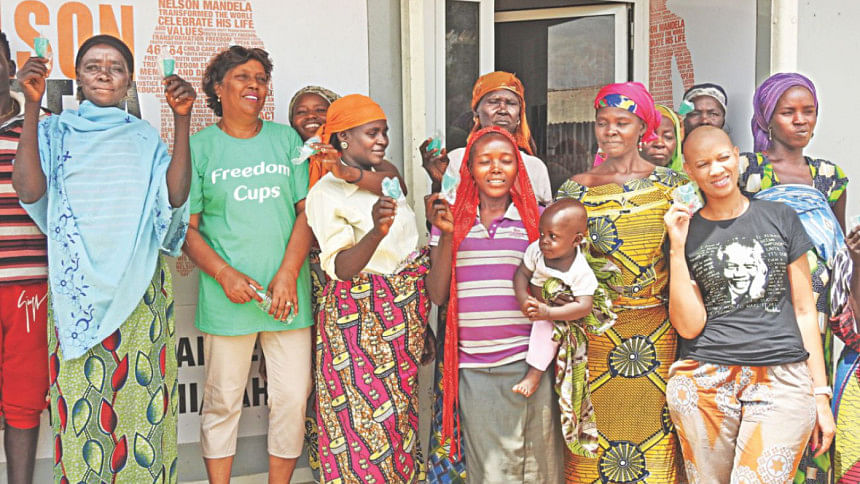Singaporean sisters making menstruation manageable

In remote parts of Nepal, young girls dread growing up. During their periods each month, girls and women are banished into menstrual huts, often located at the fringe of villages. Isolated in the name of tradition, they brave extreme weather and predators, including snakes, rapists and even death. Those who manage to remain in their communities are often too embarrassed to dry out their menstrual rag cloths after washing, thereby risking infection.
Managing menstruation is a huge problem across the globe. Over 800 million women between the ages of 15 and 49 are menstruating on any given day, studies show.
Yet, a significant proportion of women have little or no access to feminine hygiene sanitation during their periods.
In the Philippines, plantation workers miss a week of work – and a week of income – because they cannot afford sanitary pads. And in India, over 113 million adolescent girls are at risk of dropping out of school because of the stigma surrounding menstrual health, according to the World Bank.
Championing a change in the way women face menstruation issues is Singapore-based feminine hygiene products company Freedom Cups.
The social startup, founded by three Singaporean sisters, distributes menstrual cups around the world to women in need and sells them to those who can afford it.
The bell-shaped cups can be fitted under the cervix, like a tampon, where they sit and collect menstrual blood for up to 12 hours. But unlike tampons and pads, the cups can be washed and cleaned for reuse.
The company's co-founder Vanessa Paranjothy, 29, said: "Freedom Cups helps women in the First World to reduce waste. It also helps women living in the Third World who cannot afford sanitary products."
She added: "Periods are a problem on so many different fronts. They are huge contributors to waste, keeping girls from school, earning women less money. We want to eradicate the period problem."
Together with her sisters – Joanne, 26, and Rebecca, 21 – she created Freedom Cups.
Their cause has attracted global attention. Last year, the sisters made the Forbes 30 Under 30 Asia list, which recognises 30 outstanding individuals in various fields – from social entrepreneurship to sports. And in April, Vanessa won the Commonwealth Youth Award for Asia, which recognises young people from every region of the Commonwealth whose innovative projects have had a significant impact on their communities.
Vanessa said that the cups have been well received, despite some initial apprehension. "When we first went to a village in the Philippines, the village head told us to distribute the cups only to married women," she said. "But after the women tried the cups, they came back to get more for their daughters."
Made of medical grade silicone, each cup lasts up to 10 years, which is the equivalent of about 5,000 disposable sanitary products, Vanessa said. "This makes it the more economical and eco-friendly option."
The fact that the cups can be used for up to 12 hours means they last much longer than a pad or tampon, making them ideal for women living in areas with no toilets, electricity or running water, said Vanessa. Doctors, however, advise users to take precautions against infection.
Dr Chris Chong, a gynaecologist at Gleneagles Medical Centre, said that for any menstrual cup to work safely, it must not cause an allergic reaction, and the user must be able to remove it when necessary. "Toxic shock syndrome is linked to people leaving tampons and menstrual cups in for too long," he said. "The main thing is to remember to remove them."
Vanessa learnt about menstrual cups from a friend who had returned from an internship with a non-profit organisation in Guatemala in 2012. A social sciences graduate from Singapore Management University, she was working in human resources with a recruitment company. But after learning about the cup and realising its potential, she decided to quit her job and dive in head first.
The sisters redesigned the cups to be smaller, to suit women who are first-timers with "anything invasive." They then manufactured them in the United States.
Freedom Cups gives away one reusable menstrual cup for every cup it sells. The cups, which retail for 35 Singapore dollars (USD 25) each, are available on Freedom Cups' website and via retailers in Singapore.
Undergraduate Yin Pei Shan, 22, who has been using the cup for three years, said she was initially afraid of making the jump from pads and tampons to menstrual cups, "But using it has made my life so convenient, now I can swim and do water sports," Yin said. "This is a cause that is also giving back to women in need, so I am happy to be supporting them in some way."
Since they began in 2015, the sisters have distributed 3,000 cups to underprivileged women in Singapore and around the world. They have embarked on 16 projects in seven countries – Singapore, Malaysia, Cambodia, the Philippines, India, Nepal and Nigeria – to distribute the cups to the needy and spread awareness about menstrual health.
But for the sisters, the work has only just begun. They hope to reach out to more women, saying that their greatest satisfaction comes from seeing a change in the lives of the women they have helped.
"We want to make periods a problem of the past," said Vanessa. "Only then can women progress."
www.freedomcups.org

 For all latest news, follow The Daily Star's Google News channel.
For all latest news, follow The Daily Star's Google News channel. 



Comments